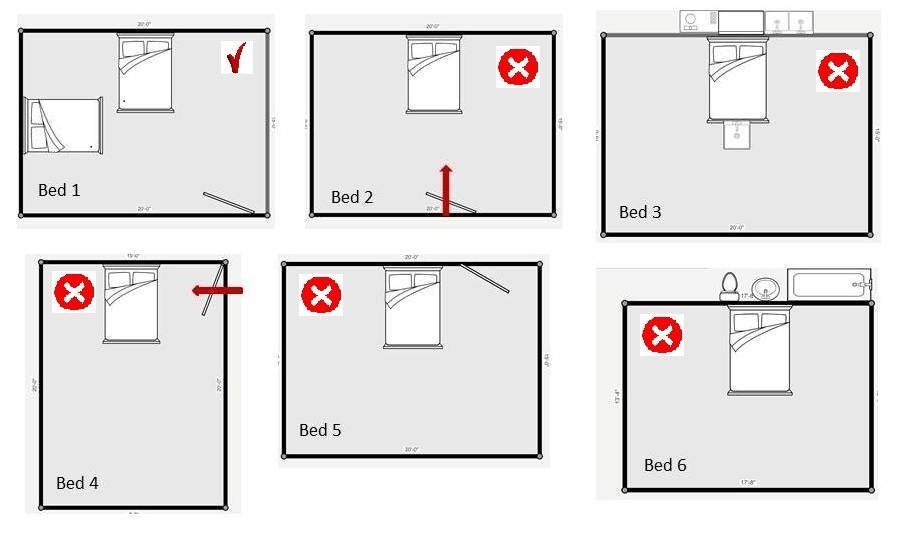Unlock Better Sleep with Feng Shui Bed Placement
Are you tossing and turning, struggling to catch some Z's? Your bedroom layout, particularly your bed placement, might be the culprit. According to feng shui, an ancient Chinese philosophical system, the way you arrange your furniture can profoundly impact your sleep, energy levels, and overall well-being. By understanding and applying the principles of optimal bed positioning, you can create a sanctuary for restful sleep and improved vitality.
Feng shui, literally translated as "wind-water," emphasizes harmonizing individuals with their surrounding environment. It's about creating balance and optimizing the flow of energy, or "chi," within a space. In the context of the bedroom, the placement of your bed becomes paramount, as it's where you spend a significant portion of your time, recharging and rejuvenating. Optimal bed positioning, according to feng shui guidelines, is believed to foster a sense of security and promote sound sleep.
The historical roots of feng shui can be traced back thousands of years in China, where it was initially used to site buildings, particularly tombs and other structures of importance. Over time, these principles were adapted and refined for residential spaces, with a focus on creating harmonious living environments. The fundamental idea is to arrange furniture in a way that allows for the free flow of positive energy, thereby enhancing the occupants' well-being.
One of the primary concerns addressed by feng shui bed placement rules is the "commanding position." This refers to positioning your bed so you can see the door without being directly in line with it. This placement allows you to feel in control of your space and promotes a sense of security and relaxation, which is crucial for quality sleep. Conversely, having your feet point directly towards the door is known as the "coffin position" and is considered inauspicious in feng shui.
Another key aspect of feng shui bed placement is avoiding positioning your bed directly under a window. Windows are considered portals for energy, both positive and negative. Sleeping directly beneath a window can make you feel vulnerable and exposed, potentially disrupting your sleep. Furthermore, it can lead to energy leaks, leaving you feeling drained and fatigued.
Implementing feng shui principles for your bed can yield numerous benefits. For example, better sleep is often cited as a key advantage. By creating a harmonious and balanced bedroom environment, you can encourage a deeper, more restful sleep, waking up feeling refreshed and energized. Another benefit is increased energy levels. A well-placed bed can optimize the flow of chi, promoting vitality and reducing feelings of sluggishness. Finally, improved well-being is another potential advantage. By aligning your bedroom with feng shui principles, you can create a sanctuary that fosters peace, tranquility, and a sense of overall well-being.
A simple action plan for implementing feng shui principles for your bed includes first identifying the commanding position in your bedroom. Then, reposition your bed accordingly, ensuring you have a clear view of the door without being directly in line with it. Next, avoid placing your bed under a window or directly against a shared wall with a bathroom. Finally, declutter your bedroom and create a serene environment.
Here are a few best practices for feng shui bed placement: avoid placing your bed directly across from the door; ensure a solid wall behind your headboard; keep the area under your bed clear; avoid mirrors reflecting the bed; and introduce calming colors and textures into your bedroom.
Advantages and Disadvantages of Feng Shui Bed Placement
| Advantages | Disadvantages |
|---|---|
| Improved Sleep Quality | Can be restrictive in small spaces |
| Increased Energy Levels | Requires rearrangement of furniture |
| Enhanced Sense of Well-being | May clash with personal aesthetic preferences |
Here are some common FAQs about feng shui bed placement: What if I can't avoid placing my bed under a window? (Consider using curtains or blinds to mitigate the energy flow.); Is it okay to have my bed against a shared wall? (Ideally, avoid shared walls, especially with bathrooms.); What if my bedroom is small and I have limited options for bed placement? (Prioritize the commanding position as much as possible.); and so on.
In conclusion, optimizing your bed placement using feng shui principles can significantly impact your sleep, energy levels, and overall well-being. By understanding and applying these guidelines, you can create a bedroom that promotes rest, rejuvenation, and a harmonious flow of energy. While it may require some adjustments to your current layout, the potential benefits of improved sleep, increased vitality, and a greater sense of peace make exploring feng shui bed placement a worthwhile endeavor. Take the time to assess your current bedroom layout and consider how you can incorporate these principles to create a more supportive and nurturing sleep environment. Your well-being will thank you for it.
Tucker carlson wife age and pictures
The surprised pikachu face a deep dive into the meme phenomenon
Navigating medicare understanding plan g plus secure options




:max_bytes(150000):strip_icc()/tips-for-a-bed-aligned-with-the-door-1274764_V7-a51033100e99493fa59d12f522411548.png)


